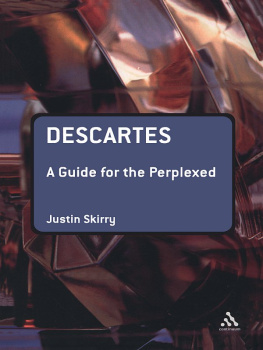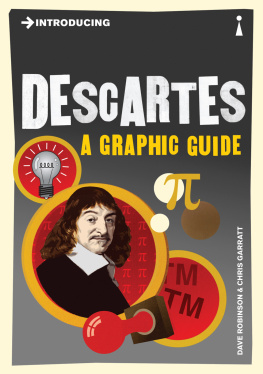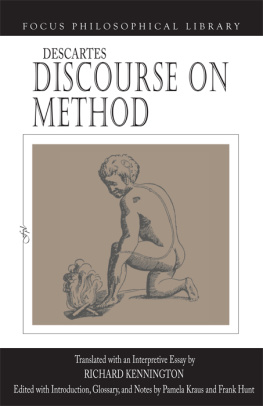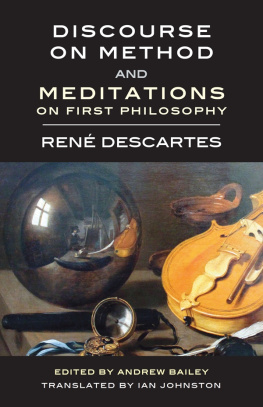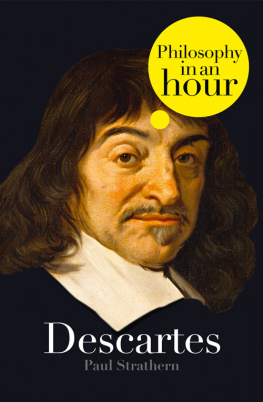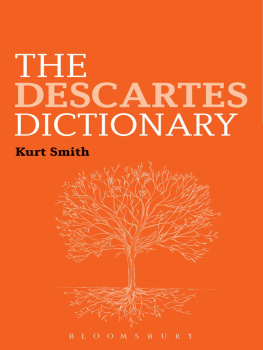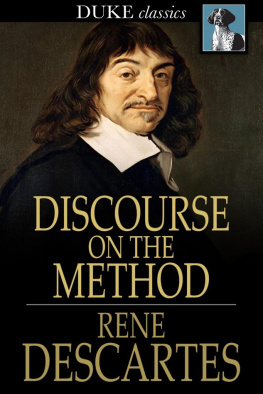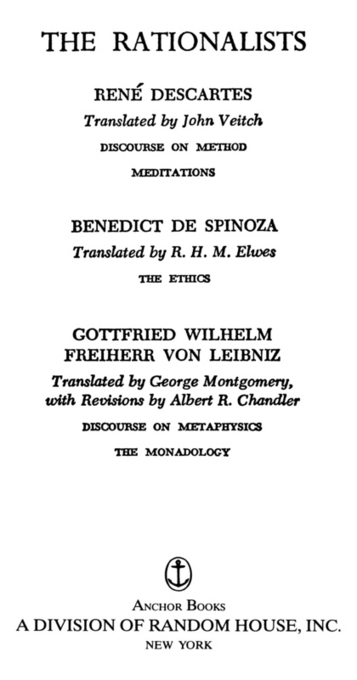F IRST A NCHOR B OOKS E DITION , 1974
All rights reserved under International and Pan-American
Copyright Conventions. Published in the United States by
Anchor Books, a division of Random House, Inc., New York,
and simultaneously in Canada by Random House of Canada
Limited, Toronto. Originally published in the United States
by Dolphin Books in 1960.
Anchor Books and colophon are registered trademarks of
Random House, Inc.
Library of Congress Cataloging-in-Publication Data
The Rationalists.
p. cm.
Reprint. Originally published Garden City, N.Y.:
Doubleday, 1960.
Contents: Discourse on method; Meditations
Ren DescartesThe ethics / Benedict de Spinoza
Discourse on metaphysics : The monadology
Gottfried Wilhelm Freiherr von Leibniz.
1. Philosophy, Modern17th Century. 2. Rationalism.
I. Descartes, Ren, 15961650. II. Leibniz, Gottfried
Wilhelm, Freiherr von, 16461716.
III. Spinoza, Benedictus de, 16321677.
Ethica. English. 1990.
B801.R37 1990 90-30169
149.7dc20
eISBN: 978-0-307-77892-5
www.anchorbooks.com
v3.1
CONTENTS
REN DESCARTES
DISCOURSE ON METHOD
MEDITATIONS
DISCOURSE
ON THE
METHOD OF RIGHTLY CONDUCTING THE
REASON AND SEEKING TRUTH
IN THE SCIENCES
PREFATORY NOTE
BY THE AUTHOR
If this Discourse appear too long to be read at once, it may be divided into six parts: and, in the first, will be found various considerations touching the Sciences; in the second, the principal rules of the Method which the Author has discovered; in the third, certain of the rules of Morals which he has deduced from this Method; in the fourth, the reasonings by which he establishes the existence of God and of the Human Soul, which are the foundations of his Metaphysic; in the fifth, the order of the Physical questions which he has investigated, and, in particular, the explication of the motion of the heart and of some other difficulties pertaining to Medicine, as also the difference between the soul of man and that of the brutes; and, in the last, what the Author believes to be required in order to greater advancement in the investigation of Nature than has yet been made, with the reasons that have induced him to write.
A DISCOURSE ON METHOD
PART I
Good sense is, of all things among men, the most equally distributed; for every one thinks himself so abundantly provided with it, that those even who are the most difficult to satisfy in everything else, do not usually desire a larger measure of this quality than they already possess. And in this it is not likely that all are mistaken: the conviction is rather to be held as testifying that the power of judging aright and of distinguishing truth from error, which is properly what is called good sense or reason, is by nature equal in all men; and that the diversity of our opinions, consequently, does not arise from some being endowed with a larger share of reason than others, but solely from this, that we conduct our thoughts along different ways, and do not fix our attention on the same objects. For to be possessed of a vigorous mind is not enough; the prime requisite is rightly to apply it. The greatest minds, as they are capable of the highest excellences, are open likewise to the greatest aberrations; and those who travel very slowly may yet make far greater progress, provided they keep always to the straight road, than those who, while they run, forsake it.
For myself, I have never fancied my mind to be in any respect more perfect than those of the generality; on the contrary, I have often wished that I were equal to some others in promptitude of thought, or in clearness and distinctness of imagination, or in fulness and readiness of memory. And besides these, I know of no other qualities that contribute to the perfection of the mind; for as to the reason or sense, inasmuch as it is that alone which constitutes us men, and distinguishes us from the brutes, I am disposed to believe that it is to be found complete in each individual; and on this point to adopt the common opinion of philosophers, who say that the difference of greater and less holds only among the accidents, and not among the forms or natures of individuals of the same species.
I will not hesitate, however, to avow my belief that it has been my singular good fortune to have very early in life fallen in with certain tracks which have conducted me to considerations and maxims, of which I have formed a method that gives me the means, as I think, of gradually augmenting my knowledge, and of raising it by little and little to the highest point which the mediocrity of my talents and the brief duration of my life will permit me to reach. For I have already reaped from it such fruits that, although I have been accustomed to think lowly enough of myself, and although when I look with the eye of a philosopher at the varied courses and pursuits of mankind at large, I find scarcely one which does not appear vain and useless, I nevertheless derive the highest satisfaction from the progress I conceive myself to have already made in the search after truth, and cannot help entertaining such expectations of the future as to believe that if, among the occupations of men as men, there is any one really excellent and important, it is that which I have chosen.
After all, it is possible I may be mistaken; and it is but a little copper and glass, perhaps, that I take for gold and diamonds. I know how very liable we are to delusion in what relates to ourselves, and also how much the judgments of our friends are to be suspected when given in our favour. But I shall endeavour in this discourse to describe the paths I have followed, and to delineate my life as in a picture, in order that each one may be able to judge of them for himself, and that in the general opinion entertained of them, as gathered from current report, I myself may have a new help towards instruction to be added to those I have been in the habit of employing.
My present design, then, is not to teach the method which each ought to follow for the right conduct of his reason, but solely to describe the way in which I have endeavoured to conduct my own. They who set themselves to give precepts must of course regard themselves as possessed of greater skill than those to whom they prescribe; and if they err in the slightest particular, they subject themselves to censure. But as this tract is put forth merely as a history, or, if you will, as a tale, in which, amid some examples worthy of imitation, there will be found, perhaps, as many more which it were advisable not to follow, I hope it will prove useful to some without being hurtful to any, and that my openness will find some favour with all.
From my childhood, I have been familiar with letters; and as I was given to believe that by their help a clear and certain knowledge of all that is useful in life might be acquired, I was ardently desirous of instruction. But as soon as I had finished the entire course of study, at the close of which it is customary to be admitted into the order of the learned, I completely changed my opinion. For I found myself involved in so many doubts and errors, that I was convinced I had advanced no farther in all my attempts at learning, than the discovery at every turn of my own ignorance. And yet I was studying in one of the most celebrated schools in Europe, in which I thought there must be learned men, if such were anywhere to be found. I had been taught all that others learned there; and not contented with the sciences actually taught us, I had, in addition, read all the books that had fallen into my hands, treating of such branches as are esteemed the most curious and rare. I knew the judgment which others had formed of me; and I did not find that I was considered inferior to my fellows, although there were among them some who were already marked out to fill the places of our instructors. And, in fine, our age appeared to me as flourishing, and as fertile in powerful minds as any preceding one. I was thus led to take the liberty of judging of all other men by myself, and of concluding that there was no science in existence that was of such a nature as I had previously been given to believe.


